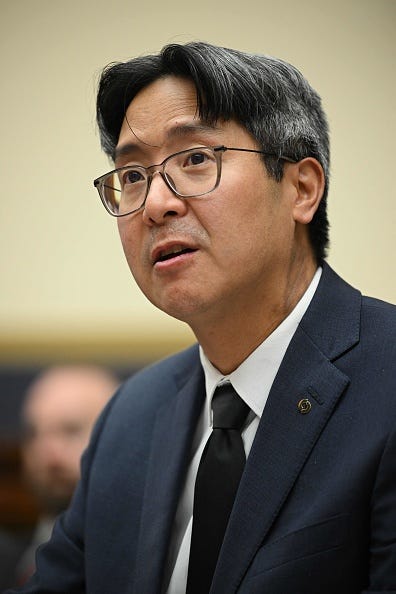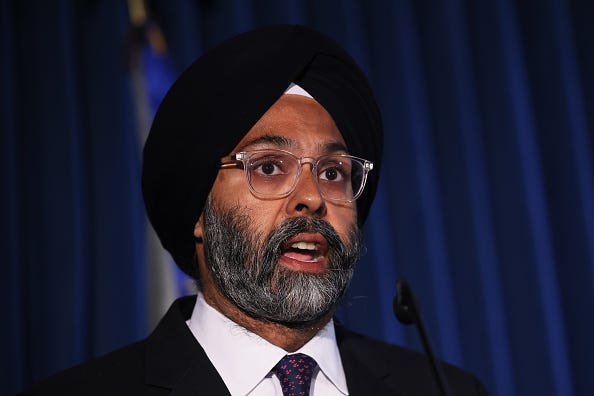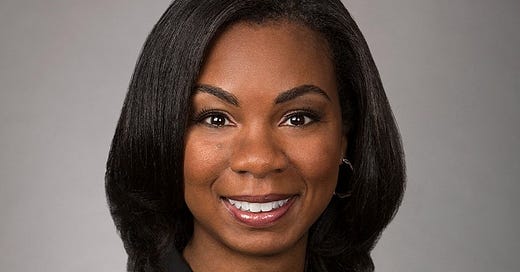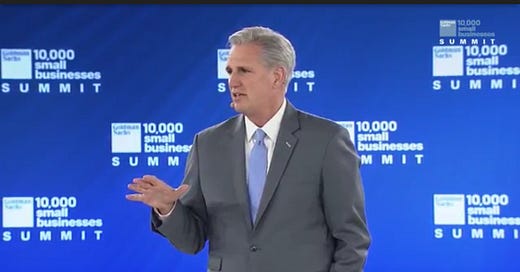
Assessing the Biden Regulators; Hsu Comes Out Swinging on Preemption; SEC Enforcement Chief Steps Down; Credit Unions' Lawsuit Fund
Capitol Account: Free Weekly Edition
Financial regulation news is still bubbling up, even as Washington’s focus turns to politics. On that front, the CFTC’s effort to prevent the trading platform Kalshi from listing contracts on the outcome of the 2024 election was dealt a fatal blow by the D.C. Circuit this week. And the top Republican on the FDIC gave a wide-ranging talk on banking rules — a preview, perhaps, of what the agency’s agenda will look like if Donald Trump wins in November. We also took an in-depth look at a DOJ-FTC inquiry that targets private equity. It’s provided a lot of grist for potential action by Chair Lina Khan and Jonathan Kanter, the assistant attorney general for antitrust, if they are still in their posts next year.
At the SEC, the enforcement director announced that he will leave later this month. Meanwhile, the banking industry cheered the acting comptroller of the currency’s decision to support its lawsuit against an Illinois law that bars banks from collecting swipe fees on taxes and tips. Speaking of the courts, a trade association has set up a special fund for suing regulators. For our Friday interview, we sat down with a Columbia Law School professor who offered a candid take on the Biden administration’s efforts on financial oversight.
Thanks for reading our digest of articles published this week. The daily newsletter had more stories that you won’t find anywhere else. Click below to subscribe.
Friday Q and A: With the election coming up, it’s a good moment to assess the last four years of progressive leadership at the financial regulators. So we sat down this week with Kathryn Judge, a leading academic who describes her political views as left of center, to get her perspective on the Biden administration’s accomplishments. The Columbia Law School professor sees a bit of a lost opportunity.
Judge has been advising Washington policy makers for years, including serving on the advisory committee of the Office of Financial Research. Her recent book focuses on middlemen in the economy, but her roots are in banking oversight. She has studied and written about the structure of the U.S. financial regulatory system, its ability to respond to crises and its success in fostering prosperity.
Read on for Judge’s candid thoughts on the Biden rulemaking record, as well as her take on the Basel endgame redo, the lobbying power of Wall Street and why agencies need to get comfortable with litigation risk. What follows is our (lightly edited and condensed) conversation.
Capitol Account: How would you rate the Biden administration on financial regulation?
Kathryn Judge: The progress on financial regulation has meaningfully lagged relative to their progress on other fronts of economic policy. When it comes to economic policy generally, I think this administration has been exceptional. It's done a really nice job of helping to understand the big-picture structural challenges that the economy has been facing for some time – and trying to address those challenges through revitalization of antitrust, through efforts at trying to promote broader economic prosperity.
CA: Where have the policies fallen short?
KJ: A lot of what we're hearing from both parties is a need to support the middle class, to create economic opportunity. And yet there hasn't been sufficient attention either to the resilience of the financial system or, more broadly, to the structure of the financial system and the role that it is going to play in helping to achieve those objectives.
CA: Republicans have spent the last four years complaining about overreach. They may not agree with you.
KJ: It's not clear that either party has a good vision for how they want a financial system to look…I think there's more intellectual work to be done to really understand, how do you regulate finance to try to achieve these broader aims?...There's been meaningful progress in financial regulation, but I think there's a lot more to go.
CA: Is the Basel endgame an example of something you're disappointed in?
KJ: There's a lot of different pieces going on there. You don't want to oversimplify. I do think the aggressiveness of the industry pushback was a significant challenge, and the form of the industry pushback was a significant challenge. I've been surprised every time I've been in D.C. since the Basel III proposal came out, that I'm seeing ads at bus stops. We're seeing football ads. And I think some of them are playing on misunderstandings.
CA: Like what?
KJ: Some of the advertising that suggested there was a relationship, for example, between Basel III and whether or not these two very cute little kids could get lollipops – whether or not their mom could afford to buy them lollipops. [That] was really playing off the fact that people are, understandably, frustrated with inflation. They associate that with the Fed, and now the Fed is doing this other thing called Basel III. I don't think it was because there was really any discernible relationship at all between the price of consumer goods and Basel III. Some of those tactics were counterproductive.
CA: What did you think of the pullback that Fed Vice Chair for Supervision Michael Barr recently outlined?
KJ: The very fact that they are engaging in a re-proposal is in many ways a concession. The original proposal came out in the summer of 2023. It ideally should have already been finalized.
CA: Does that show the power of the bank lobby?
KJ: That's never something to be underestimated. But I think if we try to dismiss it as merely the byproduct of lobbying, we're going to miss some of the bigger lessons…We haven't done the job that we need to, helping people to understand in an ongoing way why these types of regulations are helpful to small businesses and middle class families and working class families. There are multiple reasons for that.
CA: How do you make that case?
KJ: We can go back to the last financial crisis and we can see that the wealthy recovered with incredible speed, even though they took a big hit. Whereas the more marginalized groups had a much harder time and really didn't recover, oftentimes, in terms of net worth. They were out of the workforce a lot longer…Same thing with small businesses; the lack of access to financing was significant…There's more work to be done to help people understand that when we are investing in resilience, we are investing in the long-term health of the financial system…(Friday)
Click here to subscribe and read the rest of the interview.
Thanks for reading. Follow us on X @CapitolAccount and on LinkedIn by clicking here. We’re always looking for stories, so if you have any suggestions on what we should cover (or comments about Capitol Account), shoot us a note. Rob can be reached at: rschmidt@capitolaccountdc.com and Ryan at rtracy@capitolaccountdc.com. If somebody forwarded this to you and you’d like to subscribe, click on the button below. Please email for information on our special rates for government employees, academics and groups: subscriptions@capitolaccountdc.com.
Stepping up: Big banks have been pleading with Acting Comptroller Michael Hsu to stomp out the growing number of state laws sprouting up across the country that restrict their businesses. Late Wednesday, the industry finally got what it wanted, at least in one locale. And the OCC came out swinging.
Hsu’s assistance, delivered in an amicus brief in an Illinois federal court, puts the agency on the same side as banks and credit unions suing to overturn a new law that bars lenders from collecting swipe fees on taxes and tips in the state. But more importantly to financial firms, the filing was an indication that the comptroller is willing to take a strong stance on the longstanding principle that federal banking laws should preempt state actions.
The OCC didn’t mince words, calling the Illinois Interchange Fee Prohibition Act “ill-conceived, highly unusual and largely unworkable.” It added that the measure would “create extraordinary uncertainty and impose debilitating operational challenges” on federally-chartered banks’ ability to operate a national payments system.
The filing was similarly blunt when it came to the primacy of federal banking law:
“Although the IFPA’s requirements are vague and ambiguous in many respects, this much is clear: the IFPA prevents or significantly interferes with federally-authorized banking powers that are fundamental to safe and sound banking and disrupts core functionalities that drive the nation’s economy. In short, the IFPA constitutes both bad policy and an unlawful interference with federally granted powers.”
The OCC’s position isn’t entirely surprising, given the agency’s historical defense of preemption and Hsu’s vow in July to “vigorously” continue that tradition. But many bank executives had begun to worry whether the comptroller would follow through, given the political sensitivities involved and his lack of senate confirmation.
Opponents of the Illinois effort, however, could hardly have asked for more.
“You have the national bank regulator telling the state: No,” said Scott Talbott, chief lobbyist at the Electronic Transactions Association, whose members include banks, card networks and others in the payments business. “The optics, combined with the strength of their argument, is powerful – and persuasive.”
While the OCC’s backing gives the industry a big boost in the Illinois case, it doesn’t necessarily mean the agency will weigh in on other state measures.
Banks are especially exercised over “fair access” laws passed in Florida and Tennessee that aim to prevent the closure of accounts for political or religious reasons…(Thursday)
Click here to subscribe and read the rest of the article.
Exiting: Gurbir Grewal, the SEC enforcement director who became a lightning rod for Gary Gensler’s crackdown on crypto, will step down at the end of next week.
Grewal, who left his job as the New Jersey attorney general to join the commission in July 2021, oversaw a shift in the division’s digital asset focus, moving from cases against tokens to much bigger targets – the platforms where they are traded. That included charging Coinbase and Binance as unregistered exchanges, brokers and clearing agencies. Both lawsuits provoked howls of protest from the industry, and are still being contested in court.
Another top Grewal priority was boosting the size of corporate penalties, an initiative that was successful enough to draw numerous complaints from companies. And on Wall Street, the enforcement chief spearheaded a wide-ranging probe of “off-channel communications,” where financial firms failed to maintain records when employees used personal texts or emails to conduct business. Thus far it has resulted in settlements with some 100 firms and produced more than $2 billion in fines.
Overall, the SEC said, during Grewal’s tenure the agency has brought more than 2,400 enforcement actions (over 100 in the crypto space), which resulted in more than $20 billion in fines and disgorgement.
“Every day, he has thought about how to best protect investors and help ensure market participants comply with our time-tested securities laws,” Gensler said in a statement.
The division’s unyielding crypto stance under Grewal has been loudly decried by the industry and lawmakers (mostly Republicans) as “regulation by enforcement” – a way to bypass the agency rulemaking process by slipping dictates into settlements. “Grewal encouraged lawlessness and chaos” at the SEC, House Majority Whip Tom Emmer said on X. “Good to see him packing his bags.”
Grewal has dismissed much of the furor as “verbal gymnastics” ginned up by opponents that didn’t want to play by the same rules as everyone else. “These crypto enforcement actions have not been, and are not, without challenge,” he said in a speech earlier this year…(Wednesday)
Click here to subscriber and read the rest of the article.
Court Watch: Threatening regulators with lawsuits is part of the standard Washington playbook these days. But the main trade association for credit unions is putting its money where its mouth is.
America’s Credit Unions recently announced the formation of a $2 million legal fund to “protect and advance the interests of its members in the court system.” The idea was fueled partly by the string of Supreme Court rulings that curb the power of federal agencies (and have already encouraged a barrage of litigation). The decisions “created regulatory uncertainty, but there are also opportunities for credit unions to move their policies forward through the courts,” wrote ACU President Jim Nussle last week.
In an interview, Carrie Hunt, the group’s chief advocacy officer, says the money could be used for a range of legal actions – from head-on challenges to regulations to the filing of amicus briefs in cases brought by others. “This reflects…an evolution in our approach to advocacy,” she says…(Monday)
Click here to subscribe and see the rest of the story.













